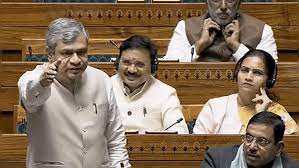Ahmedabad
(Head Office)Address : 506, 3rd EYE THREE (III), Opp. Induben Khakhrawala, Girish Cold Drink Cross Road, CG Road, Navrangpura, Ahmedabad, 380009.
Mobile : 8469231587 / 9586028957
Telephone : 079-40098991
E-mail: dics.upsc@gmail.com

The Telecommunications Bill, 2023
News: Recently, the Centre introduced the Telecommunications Bill, 2023, in Parliament.
Background:
• The proposed law attempts to bring in a slew of structural changes to current regulatory mechanisms in the sector, ranging from simplification of the licensing regime, clarity on spectrum assignment, and a stringent requirement of user verification, among other things.
Which laws does the bill replace?
• The Bill seeks to replace the Indian Telegraph Act (1885), the Wireless Telegraphy Act (1933), and the Telegraph Wires (Unlawful Possession) Act (1950), which the government sees as colonial-era archaic laws that need reforms, given that the telecom sector has
changed significantly in the last few years.
Key provisions of the Bill
Simplification of licensing regime
• The Bill seeks to simplify the current licensing regime for telecom networks by moving towards an authorisation system. Currently, the telecom department issues more than 100 types of licences, registrations, and permissions, and the Bill seeks to club many of those in a single authorisation process.
• Obtaining prior approval from central government is mandatory for (i) providing telecom services, (ii) establishing, operating, or expanding telecom networks, or (iii) possessing radio equipment.
• The Bill allows the government to take back the spectrum that is unutilised, and also allow for the sharing, trading, and leasing of spectrum.
Modification in allocation of spectrum
• While auctions will continue to be the preferred norm of assigning spectrum to entities, but outside of satellite communications, administrative allocation (by government) will be done for sectors like metro rails, community radio, defence, railways, and police, among others.
Powers of interception
• The Bill empowers the central and state governments or a specially authorised officer to seek interception, disclosure, and suspension powers in case of a public emergency or interest or safety.
• Press messages, meant for publication in India and of correspondents accredited to state or central governments, have been exempted from interception, although they can be intercepted for national security reasons.
Powers to Central government
• It empowers the Centre to take over control and management of telecommunication services and networks in the interest of national security, or in the event of a war.
Dispute Settlement
• A tiered structure for settling disputes – involving an adjudicating officer, designated committee of appeals and the Telecom Disputes Settlement and Appellate Tribunal (TDSAT) on top.
Biometric Authentication of Users
• Entities have been mandated to carry out biometric authentication of their users as a measure to curb fraud.
Eligibility requirements
• The Bill also lays down eligibility requirements for the chairperson of the Telecom Regulatory Authority of India (TRAI) to be appointed from the private sector.
What is the significance of Telecommunications Bill 2023?
• It replaces archaic colonial era laws which needed reforms in an evolving sector
• It will boost investments, better services, entry of bigger players as it provides for allocation of satellite services which is a global norm. It will encourage competitive prices.
• The above provision will also help drive innovation, create opportunities for startups, and strengthen the country’s position in the global satellite market.c
• Stringent provisions are there to ensure sim cards are not issued without KYC and misused for fraudulent calls.
• A provision of online dispute resolution for grievance redressal will usher in ease of doing business.
• It does not interfere with OTT.
• A single authorization process will do away with multiple licenses as seen in earlier laws.
What are the concerns?
• The overarching powers to Centre to take over, manage and suspend telecom services or networks in interest of national security, war and proposal to intercept messages and services suspension in case of public emergency is likely to encourage misuse of provision by the executive.
• Legal Challenges to Administrative Allocation: Supreme Court’s 2G spectrum allotment ruling of 2012 had recommended auctions of scarce natural resources. The ‘administrative allocation’ provision may go against this ruling.
• The definitions of telecom, telecom services and what constitutes a message are so broad that it potentially leaves a door open for wide interpretation. Experts argue that these definitions have been kept wide open to potentially regulate online platforms as well (Whatsapp, Signal, Instagram).

Address : 506, 3rd EYE THREE (III), Opp. Induben Khakhrawala, Girish Cold Drink Cross Road, CG Road, Navrangpura, Ahmedabad, 380009.
Mobile : 8469231587 / 9586028957
Telephone : 079-40098991
E-mail: dics.upsc@gmail.com
Address: A-306, The Landmark, Urjanagar-1, Opp. Spicy Street, Kudasan – Por Road, Kudasan, Gandhinagar – 382421
Mobile : 9723832444 / 9723932444
E-mail: dics.gnagar@gmail.com
Address: 2nd Floor, 9 Shivali Society, L&T Circle, opp. Ratri Bazar, Karelibaugh, Vadodara, 390018
Mobile : 9725692037 / 9725692054
E-mail: dics.vadodara@gmail.com
Address: 403, Raj Victoria, Opp. Pal Walkway, Near Galaxy Circle, Pal, Surat-394510
Mobile : 8401031583 / 8401031587
E-mail: dics.surat@gmail.com
Address: 303,305 K 158 Complex Above Magson, Sindhubhavan Road Ahmedabad-380059
Mobile : 9974751177 / 8469231587
E-mail: dicssbr@gmail.com
Address: 57/17, 2nd Floor, Old Rajinder Nagar Market, Bada Bazaar Marg, Delhi-60
Mobile : 9104830862 / 9104830865
E-mail: dics.newdelhi@gmail.com